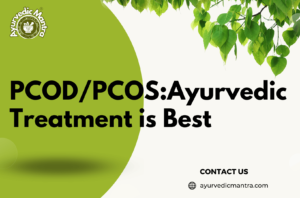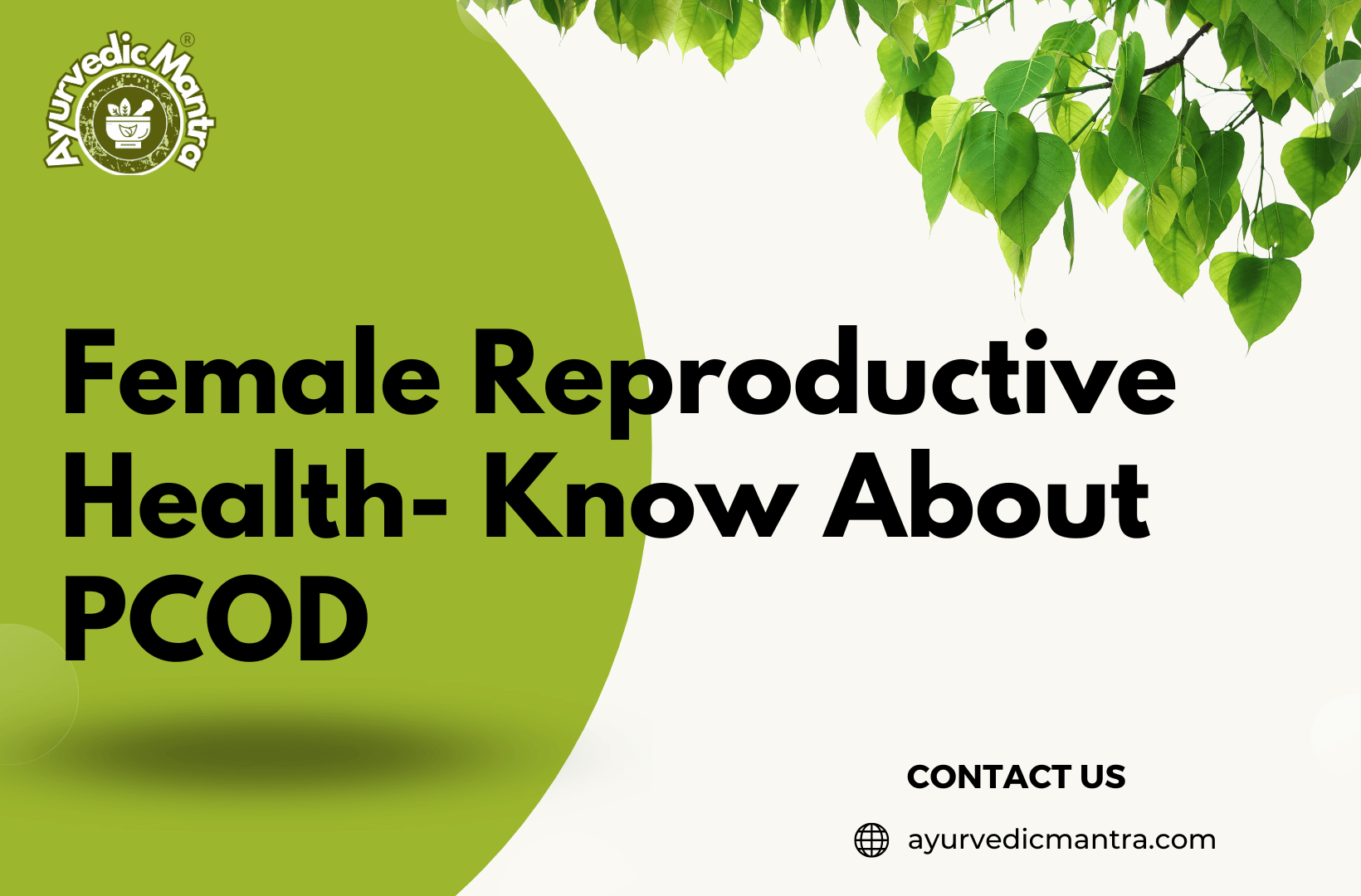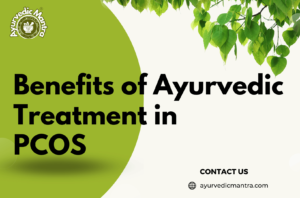
PCOD/PCOS: Ayurvedic Treatment is Best
Introduction Polycystic Ovary Disorder (PCOD) or Polycystic Ovary Syndrome (PCOS) is a common endocrine disorder affecting millions of women worldwide. It leads to hormonal imbalances,

In today’s fast-paced world, maintaining optimal health is of utmost importance, and one aspect that deserves our attention is female reproductive health. Among the various conditions that can affect women, Polycystic Ovary Syndrome (PCOS) stands out as a common and often misunderstood disorder. This comprehensive guide aims to deeply understand PCOS, its causes, symptoms, diagnosis, and effective management.
PCOS is a hormonal disorder that affects women of reproductive age. It occurs when the ovaries produce an abnormally high level of androgens, often called the “male hormones.” This hormonal imbalance can lead to a range of symptoms, including irregular periods, ovarian cysts, and difficulties with fertility.
While the exact cause of PCOS remains, elusive, genetic and environmental factors are believed to play a role. Family history can increase the likelihood of developing PCOS; insulin resistance is also linked to the condition. Lifestyle factors such as poor diet, lack of exercise, and high-stress levels can exacerbate the symptoms.
PCOS manifests differently in each individual, but some common symptoms include irregular menstrual cycles, heavy bleeding, excessive hair growth (hirsutism), acne, and weight gain. These symptoms can vary in severity, and their impact on a woman’s life can range from mild to significant.
Diagnosing PCOS involves medical history assessment, physical examination, and laboratory tests. Hormone levels, insulin resistance, and ultrasound imaging of the ovaries are key diagnostic factors. Early detection is crucial for effective management and to prevent potential complications.
PCOS is not only confined to reproductive health; it can have broader health implications. Women with PCOS are at a higher risk of developing type 2 diabetes, cardiovascular diseases, and endometrial cancer. Regular health check-ups and adopting a healthy lifestyle can help mitigate these risks.
Managing PCOS requires a multidisciplinary approach. Lifestyle modifications, including a balanced diet and regular exercise, can help improve insulin sensitivity and hormone levels. Medications may also be prescribed to regulate menstrual cycles and manage specific symptoms like hirsutism and acne.
Many women with PCOS struggle with fertility issues due to irregular ovulation. However, advancements in medical technology and fertility treatments offer hope to those desiring to conceive. Consultation with a fertility specialist can provide tailored guidance and options.
Living with PCOS can impact emotional well-being. The visible symptoms and challenges in managing the condition may lead to stress, anxiety, and depression. Seeking support from healthcare professionals, support groups, or therapists can significantly improve the overall quality of life.
PCOS can manifest during adolescence, leading to concerns about physical appearance and menstrual irregularities. It’s essential to address these concerns promptly through open communication with parents, healthcare providers, and educators.
In conclusion, understanding PCOS empowers women to take control of their reproductive health. By recognizing the symptoms, seeking an early diagnosis, and adopting a holistic approach to management, women with PCOS can lead fulfilling lives. Remember, each individual’s journey with PCOS is unique, and with the proper support and resources, navigating this condition becomes more manageable. Stay informed, stay proactive, and prioritize your well-being.
A1: Polycystic Ovary Syndrome (PCOS) is a hormonal disorder affecting the ovaries’ ability to function correctly. It involves an imbalance in hormone levels, particularly androgens, which can lead to irregular periods, ovarian cysts, and difficulties with fertility. Additionally, PCOS can contribute to other health concerns such as insulin resistance, diabetes, and cardiovascular issues.
A2: PCOS can present a variety of symptoms, which may include irregular menstrual cycles, heavy or prolonged periods, acne, hirsutism (excessive hair growth), and weight gain. Hair thinning on the scalp and skin darkening, known as acanthosis nigricans, may also occur. Recognizing these symptoms is crucial, as early diagnosis and management can help prevent potential complications.
A3: PCOS diagnosis involves a comprehensive approach. A healthcare provider will typically take a detailed medical history, conduct a physical examination, and order specific tests. Blood tests are performed to measure hormone levels, assess insulin resistance, and rule out other conditions. Ultrasound imaging of the ovaries can reveal the presence of cysts and help confirm the diagnosis.
A4: Yes, PCOS can affect fertility due to irregular ovulation. Women with PCOS may experience challenges in conceiving naturally. However, various fertility treatments are available, such as ovulation-inducing medications, in vitro fertilization (IVF), and lifestyle modifications. A fertility specialist can provide personalized guidance on the most suitable options based on individual circumstances.
A5: Lifestyle modifications play a crucial role in managing PCOS. Maintaining a balanced and nutritious diet, engaging in regular physical activity, and managing stress can improve insulin sensitivity and hormone balance. Weight management is critical, as even a modest weight loss can positively affect PCOS symptoms.
A6: Yes, PCOS is linked to several long-term health risks. Women with PCOS risk developing type 2 diabetes, cardiovascular diseases, and endometrial cancer due to hormonal imbalances and insulin resistance. Regular health check-ups, early intervention, and a healthy lifestyle can help mitigate these risks.
A7: Living with PCOS can have emotional implications, given its visible symptoms and challenges. Seeking support from mental health professionals, joining support groups, practicing mindfulness techniques, and maintaining open communication with loved ones can contribute to emotional well-being. Prioritizing self-care and adopting a positive mindset is essential.
A8: PCOS can manifest during adolescence, leading to concerns about body image and menstrual irregularities. Open communication with parents, guardians, and healthcare providers is crucial in such cases. Lifestyle adjustments, counseling, and, in some instances, medications can be part of the management plan to address physical and emotional aspects.
A9: Currently, there is no known cure for PCOS. However, effective management strategies can help control and alleviate symptoms. Women with PCOS can lead healthy and fulfilling lives by adopting a holistic approach that includes lifestyle changes, medications, and regular medical follow-ups.
A10: Finding reliable information and support is essential for managing PCOS. Consult reputable medical websites, books, and healthcare professionals for accurate and up-to-date information. Additionally, consider joining local or online support groups to connect with others navigating similar experiences. Remember, knowledge and a supportive community can make a significant difference in managing PCOS effectively.

Introduction Polycystic Ovary Disorder (PCOD) or Polycystic Ovary Syndrome (PCOS) is a common endocrine disorder affecting millions of women worldwide. It leads to hormonal imbalances,

Introduction Losing weight is a journey that requires dedication, consistency, and self-care. While there are numerous weight loss techniques out there, not all of them

Polycystic Ovary Syndrome (PCOS) is a hormonal disorder that affects millions of women worldwide. It can lead to various health complications, such as irregular periods,

In recent years, Ayurveda, an ancient system of natural healing originating from India, has gained significant popularity as an alternative approach to treating various health

आजकल वजन बढ़ने और चर्बी की वृद्धि होने की समस्या एक आम समस्या बन गई है। बढ़ते वजन और अतिरिक्त चर्बी के कारण न केवल

प्रस्तावना: आजकल वजन बढ़ने और ओबेसिटी की समस्या एक आम समस्या बन गई है। बढ़ते वजन के कारण न केवल शारीरिक समस्याएं होती हैं, बल्कि
